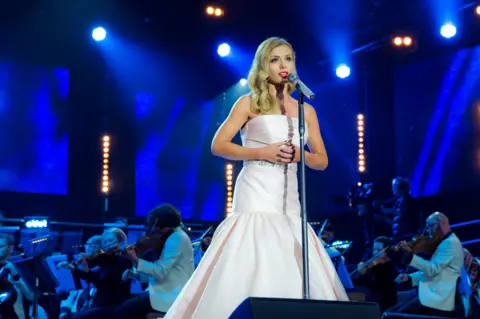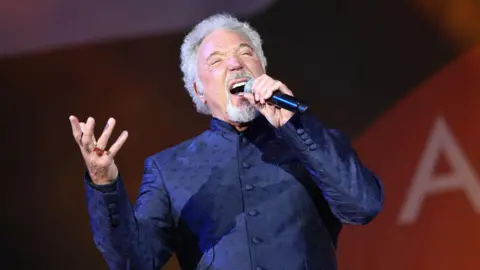Katherine Jenkins says arts in Wales 'so important'
 BBC
BBCSinger Katherine Jenkins says it is crucial that Welsh arts and music are supported, so future artists get the same opportunities she did.
The singer was speaking as she visited the Llangollen Pavilion ahead of her concert to close the International Musical Eisteddfod there on 7 July.
It has been a tough few years for the festival after cancelled events due to the Covid pandemic.
Along with increasing running costs and disappointing ticket sales last year, this has led to financial difficulties and questions over its future.
Ms Jenkins will perform in an extended series of evening concerts in June and July, designed to bring in fresh audiences to the Denbighshire festival.
Sir Tom Jones, Nile Rodgers, Manic Street Preachers and Paloma Faith are some of the other international artists performing this year.
Ms Jenkins said the arts, music and theatre in Wales are part of our "national identity".
"I think it's really important we continue to make sure that future artists are supported, that children get to experience those things at a young age," she said.
"I wouldn't be here today without having all those opportunities as a young singer. I had so many... from national youth choir, local amateur operatic societies and eisteddfods.
"I do think that festivals, eisteddfods, it's so important. It gives people the chance to come together."

The mezzo-soprano recently signed a letter to First Minister Vaughan Gething along with the likes of Sir Bryn Terfel and Michael Sheen, criticising cuts to the Welsh National Opera (WNO).
She said she was "thrilled to be able to support" the Llangollen International Musical Eisteddfod by performing there for the third time, 18 years after she made her debut appearance on the Pavilion stage.
She added that the concert line-up this year would appeal to all ages.
"It's good to see the boundaries being pushed a bit more, and that's fantastic for the longevity of the eisteddfod," she said.

This year will be the 77th International Eisteddfod since the inaugural festival in 1947, created to promote harmony and goodwill after World War Two.
Three thousand competitors are expected, from 30 countries.
Artistic director, Dave Danford, said they had "really gone for it" in terms of bringing so many global artists in, but said the core event is at the heart of it.
"It's always been important to have a mix between the competitions, the real heritage of the eisteddfod... and also the evening concerts that attract some of the same, and some different audiences," he said.
"We need to look after those core values, but put on events people want to see as well," he said.
"Rather than just trying to survive, we want to thrive."
